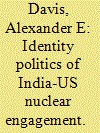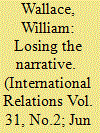| Srl | Item |
| 1 |
ID:
103664


|
|
|
|
|
| Publication |
2011.
|
| Summary/Abstract |
This article addresses the question whether membership in the 'Anglosphere' - a grouping of English-speaking states/nations - impacts the likelihood of participation in US-led coalitions of the willing. I translate the Anglosphere into International Relations (IR) theory using a tripartite division of realism, liberalism and constructivism. In a quantitative empirical analysis of a sample of US-led military coalitions between 1950 and 2001, I find robust evidence of what can be seen as the Anglosphere effect: all else constant, English-speaking states/nations tend to be more willing to join US-led military coalitions than states/nations selected at random. I conclude with a discussion of future research avenues in the Anglosphere agenda in IR.
|
|
|
|
|
|
|
|
|
|
|
|
|
|
|
|
| 2 |
ID:
130876


|
|
|
|
|
| Publication |
2014.
|
| Summary/Abstract |
Although its precise definition is contested, the concept of the 'Anglosphere' has grown in political discourse in the past decade. Anglospherist authors have defined it as a group of states tied together on the basis of shared tradition, laws, liberty and language. And yet they do not discuss India substantively, placing it firmly on the outside of its hierarchy. Others have argued the concept is based in a racialised, Anglo-Saxon identity. In 2005, Manmohan Singh surprised some domestic observers by emphasising India's positive connections to the 'English-speaking world' while speaking at Oxford University. Shortly after, India announced negotiations on a civil nuclear agreement with the US, leading to similar agreements with Canada, the UK and Australia. This article uses the contemporary India-US nuclear engagement to investigate India's position in relation to the ideational space of the Anglosphere and how this shapes India-Anglosphere relations. It is argued that India's postcolonial scepticism towards this space combined with the inherent anglocentrism in Anglosphere identity discourse limits India-Anglosphere relations while simultaneously animating nuclear engagement.
|
|
|
|
|
|
|
|
|
|
|
|
|
|
|
|
| 3 |
ID:
153645


|
|
|
|
|
| Summary/Abstract |
The United Kingdom’s awkward relationship with the countries on the European continent reflects the ambiguity of its national identity, wavering between European engagement and the English-speaking peoples, as much as differences over economic interests. The founding narrative of West European integration, after the Second World War, has also weakened with generational change, the end of the Cold War and eastern enlargement. Developing persuasive new narratives both for the United Kingdom and the European Union (EU) are necessary but difficult tasks for continuing cooperation.
|
|
|
|
|
|
|
|
|
|
|
|
|
|
|
|
| 4 |
ID:
161574


|
|
|
|
|
| Summary/Abstract |
The post-Western agenda of international relations will not be complete until it has tracked the worlding strategy of the provincialized West. This article examines one important aspect of this strategy, namely the appropriation of non-Western theory by the West as exemplified by the reception of Sun Zi’s The Art of War (or Sunzi Bingfa) in the Anglosphere. It looks at the ways in which Sunzi Bingfa has been translated, interpreted and applied in the field of Strategic Studies. This article identifies three plausible ways in which theory ‘travels’ from the East to the West, namely: (i) a useless resource or outmoded form of thinking, (ii) a useful, if exotic, culturally bound source, and (iii) a body of wisdom with universal value. It contends that most readers in the Anglosphere tend to cross these different routes to varying degrees. This critical examination of the reception of Sunzi Bingfa enables us to see that the academic field of Strategic Studies is rooted in self-other dynamics on the one hand, and characterized by an extreme parochialism on the other. The conclusion makes a normative judgment that the West can better contribute to global IR by conceiving of and relying on non-Western knowledge as an access to universal truth.
|
|
|
|
|
|
|
|
|
|
|
|
|
|
|
|